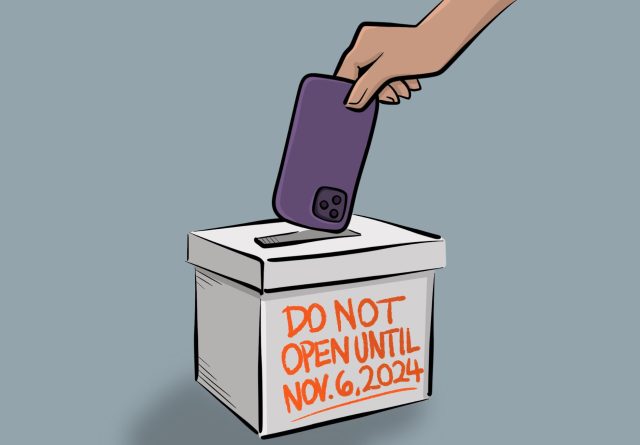[ad_1]
I spend an average of nearly four hours per day on my phone. I endlessly scroll through Instagram and TikTok, constantly refreshing them in the hopes that novel content will show up. But no matter how many times I reload, I’m always trapped in a loop of content specifically curated for me. The algorithm is designed to feed me more of what I already believe, keeping me hooked and isolated from any other perspective.
As we approach the 2024 election, relying on social media as a primary source of political information has become increasingly common. Studies show that a significant portion of the population — three-in-ten American adults — gets their news from platforms like Facebook, Instagram and TikTok, where content is often driven by algorithms rather than journalistic integrity. These platforms are rife with misinformation, and the environments they create can distort our understanding of political issues. With endless exposure to biased or false content, it’s easy to see how this method of staying informed may hinder, rather than help, voters in making sound decisions. As the election draws near, it’s time to reconsider how political information is consumed and look for more reliable ways to stay informed.
The 2016 presidential election marked a turning point for the role of social media in American democracy. Disinformation circulated, much of it deliberately designed to mislead voters on candidates and endorsements. Oftentimes, false news stories spread faster than the truth, especially on X. These stories were amplified by the echo chambers — an environment where users only encounter stories that reinforce their opinions — that social media naturally and artificially creates, making it difficult for users to separate fact from fiction. Algorithms determine the order and presentation of posts, only letting the user see what the algorithm thinks will be most relevant to them. Instead of publishing in chronological order, the algorithm presents posts and advertisements that will receive the most engagement from the user.
Social media tends to feed users more of what they already believe. Platforms rely on sophisticated algorithms that analyze clicks, likes and shares to predict what content will keep users engaged. The result is a personalized feed that reinforces the existing views, isolating users from opposing perspectives. But it’s not just the algorithm creating these spaces: Users actively shape these biased environments by engaging with content that aligns with their beliefs. In this way, both people and technology deepen this political divide, with the algorithm amplifying users’ own choices, driving them further into echo chambers.
It’s troubling that social media companies have only taken limited steps to curb this glaring problem. Despite promises to crack down on inaccurate content, platforms like Facebook and X are still outlets for disinformation, as “big tech” companies regulate themselves. The government can do little to interfere in the proceedings of social media companies: They receive protections from the First Amendment and the Tenth Article of the Human Rights Act of 1998. Relying on these platforms alone during an election year comes with significant risks since they are not regulated by the government and aren’t required to be transparent with their actions.
Both personalized feeds and echo chambers play a significant role in exacerbating political polarization. Instead of encountering balanced debates, users are increasingly exposed to one-sided content that pushes them further to ideological extremes. This makes it harder to have meaningful dialogues or consider alternative perspectives, deepening divides in society. Diverse perspectives are always important, but during election cycles, they are especially crucial to dialogue. In an election year, when the stakes are higher, access to a wide range of viewpoints ensures voters can attain a fuller understanding of the issues and candidates, enabling them to make informed decisions.
Some may argue that staying on social media during election season is essential for staying informed. After all, news breaks on X in real-time, political candidates post updates directly to their Instagram accounts and political movements gain momentum on TikTok. This urgency to stay connected in a fast-moving world overlooks a crucial point: The idea that social media is the primary source of political updates is driven by campaigns and media strategies targeting younger audiences, not an inherent necessity. While social media offers convenience, it lacks the journalistic standards and balanced reporting traditionally provided by newspapers and television news broadcasts. Just because the information is available, that doesn’t mean it’s reliable nor beneficial to our understanding.
Instead of relying solely on social media, voters should explore alternative news sources and mediums like newspapers, debates, podcasts and trusted news sites. While some outlets may have biases, like Fox News and MSNBC, they are generally held to journalistic standards and offer more balanced perspectives than social media’s algorithm-driven echo chambers. By engaging with a variety of news mediums and outlets, voters can compare perspectives and verify facts more effectively. This approach ensures that political decisions are based on well-rounded and accurate information.
As the 2024 election season gets closer, it’s time to more intellectually evaluate which news sources we trust. Social media is a powerful tool, but it’s also a dangerous one. By stepping away from their phones and diversifying our sources of information, voters can protect themselves from manipulation and make more informed decisions. This doesn’t mean abandoning technology altogether, but rather being more intentional about how it’s used. So this election season, consider taking a break from your phone. Seek out reliable sources, challenge your own biases and remember that your vote is too important to be swayed by a carefully curated feed.
Jovanna Gallegos is an Opinion Analyst from Lansing. She writes about technology, health care and things she finds interesting. She can be reached at jovanna@umich.edu.
Related articles
[ad_2]
Source link











